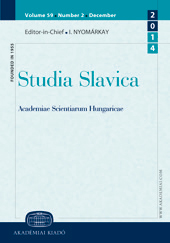Концепт «сверхчеловек» и демонические герои Достоевского в русской эссеистике Cеребряного века
The “Demonic Figures” of Dostoevsky and the Concept “сверхчеловек” in the Russian Literature of the Silver Age
Author(s): Ágnes DukkonSubject(s): Russian Literature
Published by: Akadémiai Kiadó
Keywords: Übermensch; Dostoevsky; Lermontov; Demon; rebellious hero; Silver Age
Summary/Abstract: The paper deals with the interpretations of the concept “сверхчеловек” in the Russian literature and philosophy of the Silver Age. The focus of the investigation is on the questions of similarities and differences between Nietzsche’s “Übermensch” and the Russian concept of “сверхчеловек” as well as the revival of the romantic cult of “demon”, i.e. the rebellious hero (from Lermontov to Dostoevsky) at the end of the 19th century. The reflections of these questions in the essays of Vl. Solov’ev, S. Znamensky, I. Annensky, and V. Ivanov are studied, and the author tries to point out the connections between the “demonic figures” of Dostoevsky and certain meanings of the concept of “сверхчеловек”.
Journal: Studia Slavica Academiae Scientiarum Hungaricae
- Issue Year: 63/2018
- Issue No: 1
- Page Range: 19-28
- Page Count: 10
- Language: Russian
- Content File-PDF

